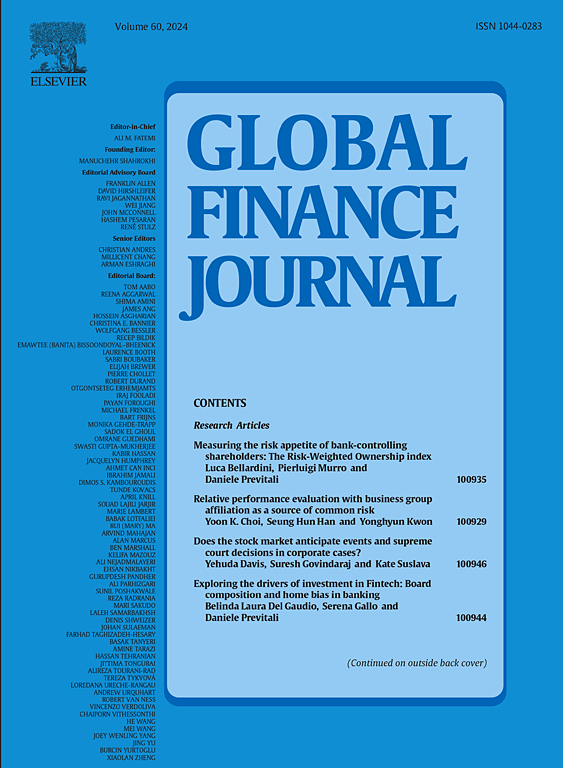Sovereign fiscal capacity, implicit subsidies, and bank value
IF 5.5
2区 经济学
Q1 BUSINESS, FINANCE
引用次数: 0
Abstract
This study examines how fiscal constraints affect banks' market value in a cross-country sample, using exogenous variations in fiscal constraints based on abnormal military spending. Increased fiscal constraints arising from exogenous spending shocks can affect bank valuation through two different channels with opposing expected effects: spending shocks weaken governments' ability to stabilize the financial system during crises, resulting in lower bank valuation; however, when fiscal constraints are heightened because of positive sector-specific spending shocks (increased military expenditure), corporate earnings—particularly in sectors that are heavily dependent on government contracts—become more predictable, which subsequently reduces banks' earnings volatility, thereby increasing their valuation. We find that fiscal constraints negatively impact banks' valuation, which is consistent with the first channel (i.e., owing to the reduced proportion of banks' value composed by implicit or explicit governmental guarantees). In addition, bank resolution reforms adopted after the global financial crisis attenuate this relationship, but do not completely eliminate it. The sovereign–bank nexus remains relevant and concentrated in large banks. Our inferences provide insights in favor of strengthening bank resolution frameworks, to reduce banks' reliance on governmental funds and ensure bailouts occur only when welfare-enhancing. By limiting expectations of unconditional government support, these regulations may mitigate too-big-to-fail perceptions.
主权财政能力、隐性补贴和银行价值
本研究在一个跨国样本中考察了财政约束如何影响银行的市场价值,使用了基于异常军事支出的财政约束的外生变化。外生支出冲击导致的财政约束增加可以通过两种不同的渠道影响银行估值,其预期效果是相反的:支出冲击削弱了政府在危机期间稳定金融体系的能力,导致银行估值下降;然而,当财政约束因积极的特定部门支出冲击(增加军事开支)而加剧时,企业收益——特别是在严重依赖政府合同的部门——变得更可预测,这随后降低了银行收益的波动性,从而提高了它们的估值。我们发现,财政约束对银行估值产生了负面影响,这与第一种渠道一致(即,由于隐性或显性政府担保构成的银行价值比例降低)。此外,全球金融危机后采取的银行决议改革削弱了这种关系,但并未完全消除这种关系。主权与银行之间的联系仍然存在,而且主要集中在大型银行。我们的推论提供了有利于加强银行处置框架的见解,以减少银行对政府资金的依赖,并确保只有在福利增加时才会进行救助。通过限制对政府无条件支持的期望,这些规定可能会减轻人们对“大而不能倒”的看法。
本文章由计算机程序翻译,如有差异,请以英文原文为准。
求助全文
约1分钟内获得全文
求助全文
来源期刊

Global Finance Journal
BUSINESS, FINANCE-
CiteScore
7.30
自引率
13.50%
发文量
106
审稿时长
53 days
期刊介绍:
Global Finance Journal provides a forum for the exchange of ideas and techniques among academicians and practitioners and, thereby, advances applied research in global financial management. Global Finance Journal publishes original, creative, scholarly research that integrates theory and practice and addresses a readership in both business and academia. Articles reflecting pragmatic research are sought in areas such as financial management, investment, banking and financial services, accounting, and taxation. Global Finance Journal welcomes contributions from scholars in both the business and academic community and encourages collaborative research from this broad base worldwide.
 求助内容:
求助内容: 应助结果提醒方式:
应助结果提醒方式:


